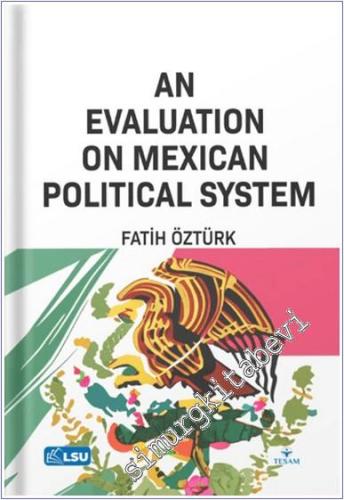Aradığınız sayfa bulunamadı
#smrgKİTABEVİ An Evaluation on Mexican Political System - 2024
Editör:
Kondisyon:
Yeni
Sunuş / Önsöz / Sonsöz / Giriş:
Basıldığı Matbaa:
ISBN-10:
6259892665
Kargoya Teslim Süresi (İş Günü):
4&6
Hazırlayan:
Cilt:
Amerikan Cilt
Boyut:
14x21
Sayfa Sayısı:
47
Basım Yeri:
İstanbul
Baskı:
1
Basım Tarihi:
2024
Kapak Türü:
Karton Kapak
Kağıt Türü:
Enso
Dili:
İngilizce
Kategori:
indirimli
126,75
Havale/EFT ile:
124,22
Siparişiniz 4&6 iş günü arasında kargoda
1199229072
616238

https://www.simurgkitabevi.com/an-evaluation-on-mexican-political-system-2024
An Evaluation on Mexican Political System - 2024 #smrgKİTABEVİ
126.75
For many years, under a one-party system, the Mexican people have lived without justice, security, or property rights. Although the principle of separation of powers is enshrined in the Constitution, the fact that Presidents, who are vested with broad powers, hold the majority in the Senate and the Chamber of Deputies and appoint members of the Federal Courts and Superior Courts, has prevented the establishment of checks and balances in the state, resulting in the one-party system becoming an unchecked power. The Institutional Revolutionary Party (PRI), with its corporatist approach to governance, transformed the political system into a dependent and controllable structure by making state institutions as well as civil society, trade unions, and the media part of the party. Although there were occasional uprisings and protests in reaction to this approach, the hegemonic ruling party did not allow the people to voice their political demands. The 1960s were the years when people began to voice their demands for political and economic rights. The reaction movements against the one-party system, which started especially under the leadership of opposition trade unions, reached their peak with the Student Events in 1968, and these events became the breaking point in the beginning of the democracy process.
For many years, under a one-party system, the Mexican people have lived without justice, security, or property rights. Although the principle of separation of powers is enshrined in the Constitution, the fact that Presidents, who are vested with broad powers, hold the majority in the Senate and the Chamber of Deputies and appoint members of the Federal Courts and Superior Courts, has prevented the establishment of checks and balances in the state, resulting in the one-party system becoming an unchecked power. The Institutional Revolutionary Party (PRI), with its corporatist approach to governance, transformed the political system into a dependent and controllable structure by making state institutions as well as civil society, trade unions, and the media part of the party. Although there were occasional uprisings and protests in reaction to this approach, the hegemonic ruling party did not allow the people to voice their political demands. The 1960s were the years when people began to voice their demands for political and economic rights. The reaction movements against the one-party system, which started especially under the leadership of opposition trade unions, reached their peak with the Student Events in 1968, and these events became the breaking point in the beginning of the democracy process.
Yorum yaz
Bu kitabı henüz kimse eleştirmemiş.





















